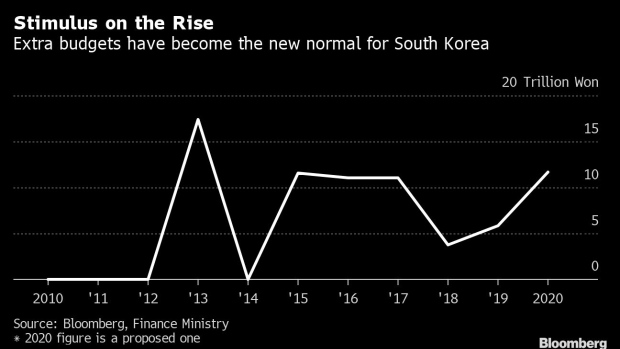Mar 3, 2020
South Korea Unveils $9.8 Billion Extra Budget to Stem Virus Fallout
, Bloomberg News

(Bloomberg) -- South Korea’s government said it’s seeking a 11.7 trillion won ($9.8 billion) extra budget to help businesses hit by the world’s second-largest coronavirus outbreak, joining policy makers around the globe intensifying responses to the epidemic.
The plan was unveiled just hours after the U.S. Federal Reserve slashed interest rates by half a percentage point in the first such emergency move since the 2008 financial crisis. Group of Seven finance chiefs also issued a statement saying they’re ready to act to shield their economies from the spreading virus.
The Bank of Korea called an emergency meeting for early Wednesday, but no outcome has been announced yet.
The latest data from South Korea show the epidemic is depressing domestic demand and hitting supply chains, with factories at home and in China operating far below capacity. President Moon Jae-in earlier called for “extraordinary” steps to protect the economy.
The plan adds 8.5 trillion won in new spending to an annual budget that was already the biggest on record. Another 3.2 trillion won is earmarked to address a tax-revenue shortfall.
The coronavirus is leaving few economies unscathed, reviving recession fears around the world. Italy, Europe’s worst-hit hot spot, has announced 3.6 billion euros ($4 billion) in emergency measures, while Hong Kong unveiled a budget that includes cash handouts to residents.
While multiple Asian central banks have lowered interest rates in response to the virus, the Bank of Korea took a more targeted approach, saying that channeling cheaper loans to businesses is a more effective way to handle the crisis for now.
South Korea’s government will submit the extra budget for parliamentary approval on Thursday. Some 10.3 trillion won worth of government bonds would be issued to fund the plan, raising the ratio of debt-to-gross-domestic-product to 41.2% from 39.8%.
The new budget allocates 2.3 trillion won to medical support, providing money for clinic construction and patient stipends, the finance ministry said. Another 2.4 trillion won would be used to provide loans and subsidies for businesses, while 3 trillion won would go to support low-income families and jobs, it said.
Before the virus hit, South Korea’s economy was showing some signs of a recovery, which the epidemic now seems to have derailed or delayed. The Bank of Korea last month cut its growth forecasts for this year to 2.1% from 2.3%.
The government last week announced a separate raft of measures, including rent subsidies for small businesses and temporary tax breaks on car purchases. In 2015, when the Middle East Respiratory Syndrome swept the nation, the parliament approved a 11.6 trillion won supplementary budget.
--With assistance from Michelle Seoh.
To contact the reporter on this story: Sam Kim in Seoul at skim609@bloomberg.net
To contact the editors responsible for this story: Paul Jackson at pjackson53@bloomberg.net, Jason Clenfield, Jiyeun Lee
©2020 Bloomberg L.P.